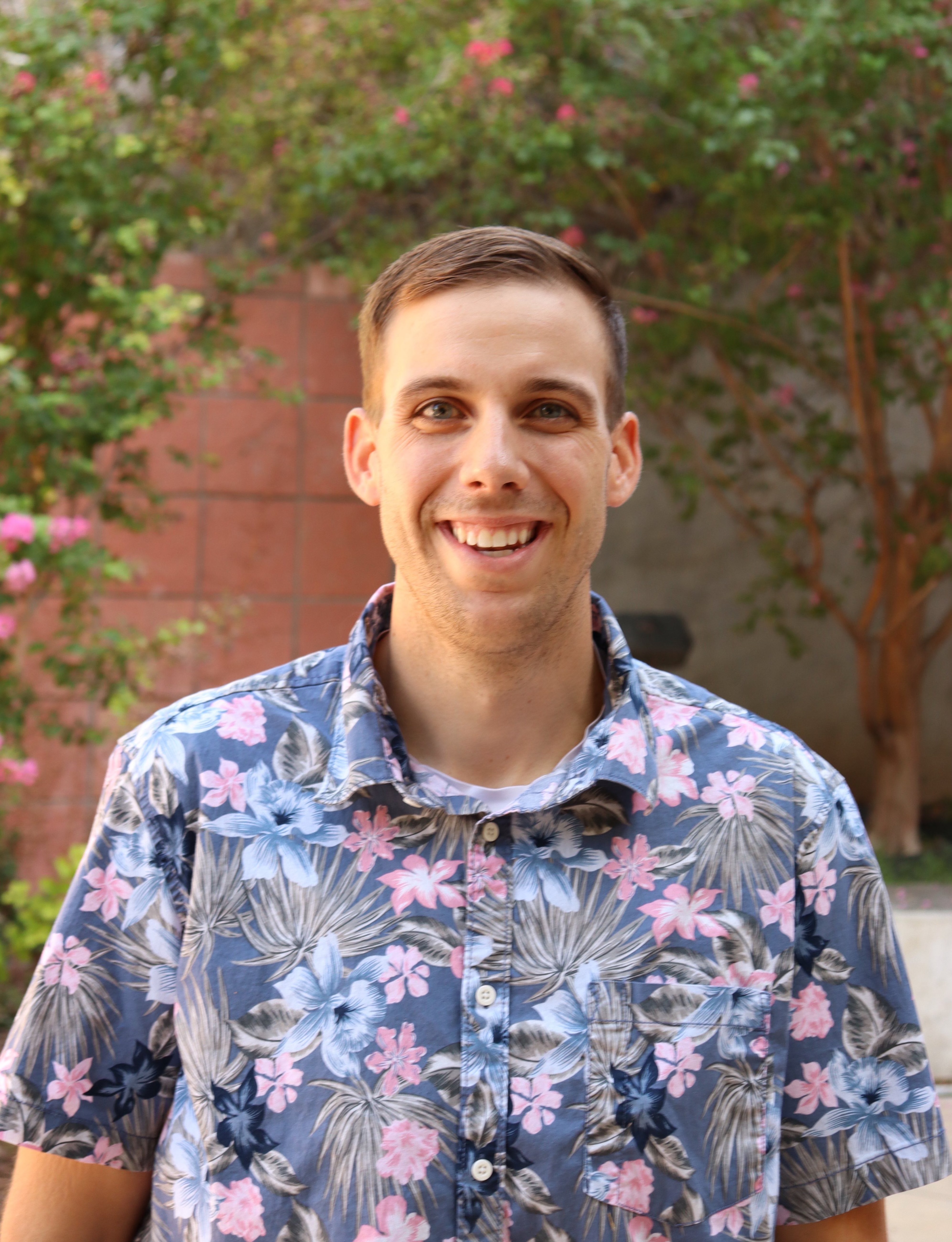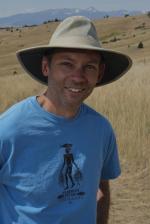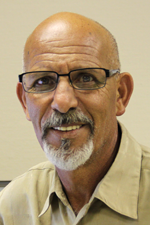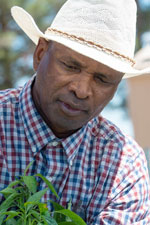Faculty
Dr. Ricardo Ramirez, Ph.D.

Department Head and Professor
Work Phone: (575) 646-3154
E-mail: ricarami@nmsu.edu
Office: Skeen Hall, Room N141
My research examines the interactions among natural enemies, herbivorous arthropods, and plants in managed systems. My lab works at the interface of basic and applied research using ecological theory within the framework of Integrated Pest Management (IPM). The goal of our research is to find solutions to herbivorous pest problems that are economically and environmentally sound to enhance ecologically based pest management. Using field, greenhouse, and laboratory studies my research examines plant-arthropod and predator-prey interactions, population and community ecology, and environmental factors that impact herbivore suppression.
Dr. Scott Bundy, Ph.D.

Professor, Entomology and Director of NMSU Arthropod Museum
Work Phone: (575) 646-3171
E-mail: cbundy@nmsu.edu
Office: Skeen Hall, Room N220
Laboratory: Skeen Hall, Room W242
My research foci are 1) the integrated pest management of arthropods impacting field crops in NM, particularly alfalfa and cotton, and 2) the bionomics and morphology of the Heteroptera, primarily the Pentatomoidea. Specifically, I am working on the seasonal biology, management, and injury impact of several insect pest species, including the alfalfa weevil and western tarnished plant bug, and in on the biology of beneficial arthropods in agricultural systems. I also have many projects on stink bugs and their relatives (Pentatomoidea) and am particularly interested in the morphology of immature Heteroptera.
Dr. Rebecca Creamer, Ph.D.
Professor, Plant Virology
Work Phone: (575) 646-3068
E-mail: creamer@nmsu.edu
Office: Skeen Hall, Room N248
Laboratory
Etiology and Management of Plant Diseases
The laboratory research focuses on two major areas of importance to New Mexico agriculture, plant viruses and a fungal endophyte of locoweed. We are currently characterizing the biology and epidemiology and Beet curly top virus which infects chile and hemp in New Mexico. This virus infects many crops and weed hosts throughout the western US. Research is ongoing to characterize new virus strains and viral strain variation at the molecular level, study the mechanism of transmission in the leafhopper vector of the virus, and document the role of weed hosts and vector populations in disease epidemiology. The lab is also studying cultivation and integrated pest management of hemp in New Mexico, with a focus on the interaction of curly top virus and its beet leafhopper vector on hemp.
We are studying the role that a fungal endophyte of locoweed plays in the toxicity of this plant. We are characterizing this Alternaria section Undifilum sp. that produces a toxin, swainsonine, that is poisonous to grazing animals. We are investigating the genetics of the fungus and the locoweeds and comparing the genetic variability in both. We are studying the ecological role of the fungus within its host plants. We are also characterizing the toxin biosynthetic pathway in various swainsonine-producing fungi.
Dr. Leslie Beck, Ph.D.

Associate Professor, Extension Weed Specialist
Work Phone: (575) 646-2888
E-mail: lebeck@nmsu.edu
Office: Skeen Hall, Room N222
Dr. Steve Hanson, Ph.D.

Associate Professor, Molecular Plant Pathology
Work Phone: (575) 646-5073
E-mail: shanson@nmsu.edu
Office: Skeen Hall, Room N322
Laboratory:
Dr. Caleb Hubbard, Ph.D.

Assistant Professor Urban Entomology
Work Phone: (575)646-5550
E-mail: calebh@nmsu.edu
Office: Skeen Hall, Room N414
Laboratory:
Dr. Joanie King
Assistant Professor, Extension Entomology Specialist
Work Phone: (575)-646-3665
E-mail: joaniek@nmsu.edu
Dr. Joanie King is an assistant professor and Extension entomologist. She earned a Ph.D. in entomology from Texas A&M University, a M.S. in entomology from the University of Georgia, a B.S. in biology from the University of Central Florida, and an A.A. from Valencia College. Alongside her Extension and outreach focus, Dr. King’s lab focuses on host-parasite interactions, community ecology, and integrated pest management (IPM). Dr. King also researches how to plan effective science outreach and science communication. In addition to serving the NMSU community through Extension and research, she is active in the Entomological Society of America. Sharing bug science is cool! Besides her work as an entomologist, she enjoys climbing, running, and photography.
Dr. Erik Lehnhoff

Associate Professor, Weed Ecology
Work Phone: (575) 646-2328
E-mail: lehnhoff@nmsu.edu
Office: Skeen Hall, Room N236
Laboratory: Skeen Hall, Room W241
My research program focuses on: (1) quantifying the impacts of weeds on desirable vegetation (crops and rangeland species) both directly and indirectly through interactions with other organisms, (2) understanding the mechanisms and processes of plant invasions, (3) assessing how cropping systems affect weed-crop dynamics mediated through soil biota, and (4) evaluating control methods for weeds within rangeland and agroecosystem contexts. The goals of this research are to develop an understanding of the complex ecological interactions of weeds with their environment, and use to this knowledge to create more sustainable rangelands and agroecosystems. Other interests include tritrophic interactions, biological control, apparent competition, weed-pollinator interactions, and invasive and native plant community responses to disturbance.
Dr. Abdel O. Mesbah, Ph.D.

Associate Professor, Superintendent Agricultural Science Center
Work Phone: (575) 985-2292 ext 123, (575)-791-1904
Fax: 575-985-2419
E-mail: aomesbah@nmsu.edu
Office: Skeen Hall, Room N141
Dr. Jane Pierce, Ph.D.

Associate Professor, Economic Entomologist
Work Phone: (575) 748-1228
E-mail: japierce@nmsu.edu
Office: Artesia Science Center 67 E. Four Dinkus Rd. Artesia, NM. 88210
- Pierce Curriculum Vitae (CV)
- Pierce Publications
- Pierce Website
Research areas include insect plant interactions with an emphasis on interactions that affect production in agroecosystems. Our goal is to manage insect pests while minimizing the need for insecticide applications. We work to accomplish this by evaluating and developing tools to manage pests including host plant resistance, biological control, and cultural controls. Specific areas of interest include fungal endophytes and resistance in grasses, resistance to Bt cotton in New Mexico, biological control of lepidopterous pests in cotton, alfalfa weevil in hay, pecan nut casebearer and pecan weevil in pecan. Cultural controls investigated include time of planting, trap cropping, row orientation and spacing and plant architecture. We are also investigating T. cruzi incidence in Triatomidae in New Mexico.
Dr. Jennifer Randall, Ph.D.

Professor and Director of the Molecular Biology and Interdisciplinary Life Sciences Graduate Program
Work Phone: (575) 646-2920
E-mail: jrandall@nmsu.edu
Office: Skeen Hall, Room N208
Laboratory:
Dr. Jennifer Randall is a Professor within the Department of Entomology, Plant Pathology, and Weed Science at New Mexico State University and the current director of the Molecular Biology and Interdisciplinary Life Sciences Graduate Program. Dr. Randall completed her B.S. in Biochemistry, a Master of Science degree in Molecular Biology with a minor in Toxicology and a Ph.D. in Molecular Biology studying plant genetics and development at New Mexico State University. As a post-doc, she studied Plant Pathology and began to study plant-microbe interactions.
Dr. Randall is a Plant Molecular Biologist and Plant Pathologist at New Mexico State University. She teaches ‘Experimental systems in Genetics’ , graduate level Bioinformatics, Microscopy, and several special topic courses at NMSU. She mentors undergraduate, graduate students, and post-doctoral associates. Her interests and research program focuses on the genetics and molecular mechanisms of plant development, plant-microbe interactions, and understanding the plant ‘innate’ immune system. There are a number of current projects within her laboratory that are focused on pecan. These include pecan rootstock development, molecular mechanisms of pecan flowering and how this relates to alternate bearing, pecan genetics in collaboration with USDA ARS Pecan Breeding and Genetics in College Station, Texas, USDA-SEFTNL Byron Georgia, Hudson Alpha, University of Georgia, Noble Foundation, University of Arizona, and the University of Tokyo. An investigation into the endophytic microbial community that is within pecan is also underway.
Dr. Randall is also a molecular plant pathologist and has diagnosed and researched several economically destructive pathogens on several crop species. Some of these diseases that are currently being researched in the Randall Lab include Pistachio Bushy Top caused by Rhodococcus spp. (Stamler et al., 2015a, Stamler et al., 2015b), Pecan bacterial leaf scorch caused by Xylella fastidiosa, chile root rot caused by Phytophthora capsici, and Phymatotrichum root rot.
Dr. Soum Sanogo, Ph.D.

Professor, Fungal Plant Pathology
Work Phone: (575) 646-3577
E-mail: ssanogo@nmsu.edu
Office: Skeen Hall, Room N252
Laboratory:
My research focuses on soilborne diseases of annual and perennial crops, with emphasis on the biology of soilborne pathogens and the use of biorational approaches for managing diseases caused by these pathogens. Disease management based on biorational approaches is aimed at using botanical extracts, inorganic substances, microbial formulations, bioactive and biostimulant crop residues, and genetic soil disinfestation. Additionally, I have research interest in aerobiology, especially on fungal composition of dusts and rainwater for air quality monitoring. My teaching activities include two courses “Fungal Biology” and “Diagnosing Plant Disorders,” which include community outreach events with the goal to create a dynamic experiential learning environment for all learners through inclusive, engaged, and best practice-based research and teaching.
Dr. Brian Schutte, Ph.D.

Associate Professor, Weed Physiology and Ecology
Work Phone: (575) 646-7082
E-mail: bschutte@nmsu.edu
Office: Skeen Hall, Room N224
Laboratory: Skeen Hall, Room W241
The goal of my research program is to develop weed management strategies that are applicable and appropriate for agricultural systems in the southwestern United States. To accomplish this goal, my students and I study weed and crop responses to combinations of tactics including herbicides and cultural practices. Through diversification, we aim to make weed management programs more reliable, more cost-effective in the long-term, and less threatening to non-target organisms.
My teaching is framed by “scientific teaching” — an approach that applies the creativity and rigor of science to teaching (Handelsam, Miller, and Pfund, 2007; ISBN: 1429201886). I teach scientifically in undergraduate and graduate courses in weed science (EPWS 311/511), plant physiology (EPWS 314/514), and scientific writing (EPWS 525).